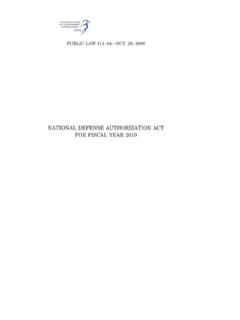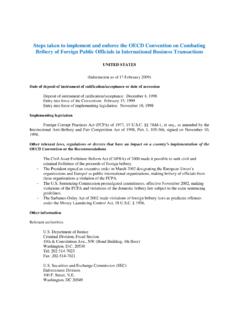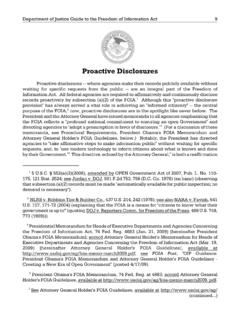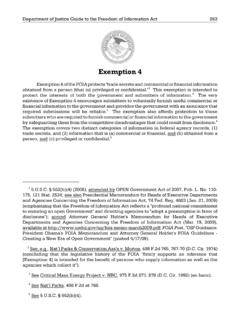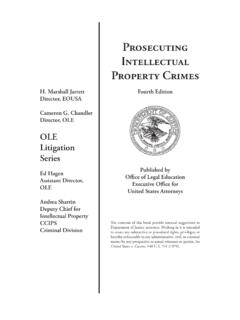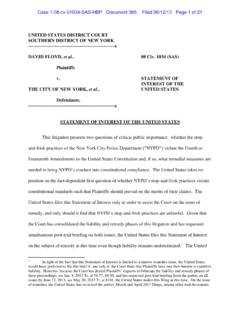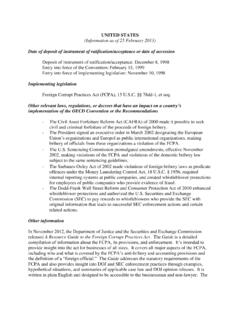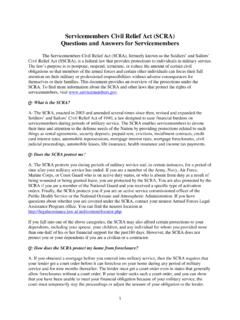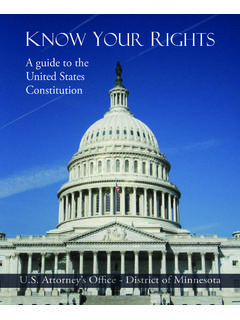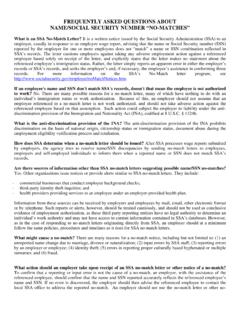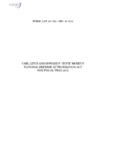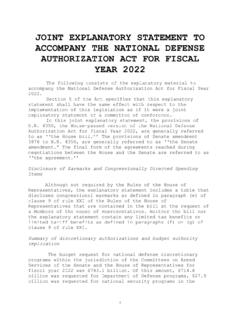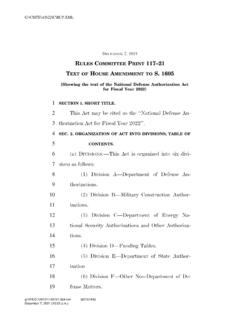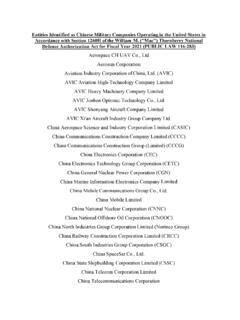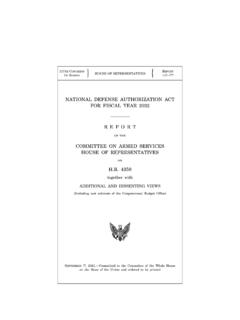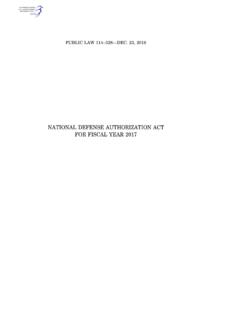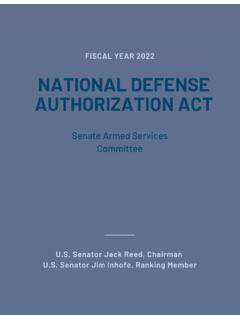Transcription of Whether Section 564 of the Food, Drug, and Cosmetic Act ...
1 (Slip Opinion) 1 Whether Section 564 of the Food, Drug, and Cosmetic Act Prohibits Entities from Requiring the Use of a Vaccine Subject to an Emergency Use authorization Section 564(e)(1)(A)(ii)(III) of the Food, Drug, and Cosmetic Act concerns only the provision of information to potential vaccine recipients and does not prohibit public or private entities from imposing vaccination requirements for a vaccine that is subject to an emergency use authorization . July 6, 2021 MEMORANDUM OPINION FOR THE DEPUTY COUNSEL TO THE PRESIDENT Section 564 of the Food, Drug, and Cosmetic Act ( FDCA ), 21 360bbb-3,1 authorizes the Food and Drug Administration ( FDA ) to issue an emergency use authorization ( EUA ) for a medical product, such as a vaccine, under certain emergency circumstances. This authoriza-tion permits the product to be introduced into interstate commerce and administered to individuals even when FDA has not approved the product for more general distribution pursuant to its standard review process.
2 Section 564 directs FDA to the extent practicable given the emergen-cy circumstances and as the [agency] finds necessary or appropriate to protect the public health to impose [a]ppropriate conditions on each EUA. FDCA 564(e)(1)(A). Some of these conditions are designed to ensure that recipients of the product are informed of certain things, including the option to accept or refuse administration of the product. Id. 564(e)(1)(A)(ii)(III). Since December 2020, FDA has granted EUAs for three vaccines to prevent coronavirus disease 2019 ( COVID-19 ). In each of these author-izations, FDA imposed the option to accept or refuse condition by requiring the distribution to potential vaccine recipients of a Fact Sheet that states: It is your choice to receive or not receive [the vaccine]. Should you decide not to receive it, it will not change your standard medical care.
3 , FDA, Fact Sheet for Recipients and Caregivers at 5 (revised June 25, 2021), 1 Because it is commonly referred to by its FDCA Section number, and for the sake of simplicity, we will refer to this provision as Section 564, rather than by its United States Code citation. 45 Op. __ (July 6, 2021) 2 ( Pfizer Fact Sheet ). In recent months, many public and private entities have announced that they will require individuals to be vaccinated against COVID-19 for instance, in order to attend school or events in person, or to return to work or be hired into a new job. We will refer to such policies as vaccination requirements, though we note that these policies typical-ly are conditions on employment, education, receipt of services, and the like rather than more direct legal In light of these developments, you have asked Whether the option to accept or refuse condition in Section 564 prohibits entities from impos-ing such vaccination requirements while the only available vaccines for COVID-19 remain subject to EUAs.
4 We conclude, consistent with FDA s interpretation, that it does not. This language in Section 564 specifies only that certain information be provided to potential vaccine recipients and does not prohibit entities from imposing vaccination I. A. Federal law generally prohibits anyone from introducing or delivering for introduction into interstate commerce any new drug or biological product unless and until FDA has approved the drug or product as safe and effective for its intended uses. See, , FDCA 301(a), 505(a), 21 331(a), 355(a); 42 262(a). A vaccine is both a drug and a biological product. See FDCA 201(g), 21 321(g); 42 262(i)(1). Consistent with Section 564, we will generally refer to it here as a product. See FDCA 564(a)(4)(C) (defining product to mean a drug, device, or biological product ). 2 For an example of the latter, see our discussion in Part of a hypothetical military order to service members.
5 3 We do not address Whether other federal, state, or local laws or regulations, such as the Americans with Disabilities Act ( ADA ), might restrict the ability of public or pri-vate entities to adopt particular vaccination policies. See, , Equal Employment Oppor-tunity Commission, What You Should Know About COVID-19 and the ADA, the Rehabili-tation Act, and Other EEO Laws (updated June 28, 2021), d-ada-rehabilitation-act-and-other-eeo-l aws (discussing the ADA). Requiring the Use of a Vaccine Subject to an Emergency Use authorization 3 In 2003, Congress addressed a problem raised in emergency situations where the American people may be placed at risk of exposure to biolog-ical, chemical, radiological, or nuclear agents, and the diseases caused by such agents, but where, [u]nfortunately, there may not be approved or available countermeasures to treat diseases or conditions caused by such agents, even though a drug, biologic, or device is highly promising in treating [such] a disease or condition.
6 Rep. No. 108-147, pt. 1, at 2 (2003). President George W. Bush had flagged this problem in his 2003 State of the Union Address, in which he proposed Project BioShield, a legislative initiative to quickly make available effective vaccines and treatments against agents like anthrax, botulinum toxin, Ebola, and plague. Address Before a Joint Session of the Congress on the State of the Union (Jan. 28, 2003), 1 Pub. Papers of Pres. George W. Bush 82, 86 (2003). Among the principal components of the proposed Project BioShield legislation were provisions to enable FDA to authorize medical products for use during emergencies even before they are proven to be safe and effective under ordinary FDA review. See, , 2122, 108th Cong. 4 (2003). At that time, the only alternative to ordinary FDA approval was 21 355(i), which authorizes FDA to exempt drugs from the ordinary approval requirements where the drug is intended solely for investigational use by experts qualified by scientific training and experience to investigate the safety and effectiveness of drugs.
7 Such a cabined investigational new drug ( IND ) exemption does not, however, allow the widespread dissemination of a drug for general public use in response to an emergency. See Rep. No. 108-147, pt. 1, at 2. Congress enacted a version of the Project BioShield legislation s EUA provision in the national defense authorization Act for Fiscal Year 2004 as Section 564 of the FDCA. See Pub. L. No. 108-136, 1603(a), 117 Stat. 1392, 1684 (2003) (codified at 21 360bbb-3).4 Section 564 authorizes the Secretary of Health and Human Services ( HHS ) who has delegated to FDA the authorities under the statute at issue here to authorize the introduction into interstate commerce of a drug, device, or biological product intended for use in an actual or potential emergency even though the product has not yet been generally approved as safe and 4 The statute has been amended since, including when Congress enacted the Project BioShield Act the following year.
8 See Pub. L. No. 108-276, 4(a), 118 Stat. 835, 853 (2004). 45 Op. __ (July 6, 2021) 4 effective for its intended use. FDCA 564(a)(1) (2); see also FDA, Emergency Use authorization of Medical Products and Related Authori-ties: Guidance for Industry and Other Stakeholders at 3 (Jan. 2017) ( EUA Guidance ) (noting delegation of most of the Secretary s authori-ties under Section 564 to FDA).5 The most pertinent part of Section 564 for purposes of your question has remained materially the same since Congress first enacted the statute in 2003. Subsection (e)(1)(A),6 titled Required conditions, provides: With respect to the emergency use of an unapproved product, the Secretary, to the extent practicable given the applicable [emergency] circumstances .. , shall, for a person who carries out any activity for which the authorization is issued, establish such conditions on an authorization under this Section as the Secretary finds necessary or appropriate to protect the public health, including [certain specified conditions].
9 5 The current version of Section 564(a)(1) provides in full: Notwithstanding any provision of this chapter and Section 351 of the Public Health Service Act, and subject to the provisions of this Section , the Secretary may author-ize the introduction into interstate commerce, during the effective period of a decla-ration under subsection (b), of a drug, device, or biological product intended for use in an actual or potential emergency (referred to in this Section as an emergency use ). The declaration under subsection (b) refers to a declaration by the Secretary that the circumstances exist justifying an EUA, which must be made on the basis of one or more types of emergencies or threats. FDCA 564(b)(1). FDA can grant an EUA where, based on the totality of scientific evidence available to the Secretary, including data from adequate and well-controlled clinical trials, if available, FDA finds that it is reasonable to believe, among other things, that the product may be effective in diagnosing, treat-ing, or preventing a serious or life-threatening disease or condition caused by a bio-logical, chemical, radiological, or nuclear agent or agents (a standard less onerous than for final approval of the product); that the known and potential benefits of the product, when used to diagnose, prevent, or treat such disease or condition, outweigh the known and potential risks of the product ; and that there is no adequate, approved, and available alternative to the product for diagnosing, preventing, or treating such disease or condi-tion.
10 FDCA 564(c). 6 Subsection (e)(1) applies to a product that FDA has not approved as safe and effec-tive for any intended use, whereas subsection (e)(2) applies to an unapproved use of an otherwise approved product. The COVID-19 vaccines fall under the former category, but the statute applies the condition at issue here to the latter category as well. See FDCA 564(e)(2)(A). Requiring the Use of a Vaccine Subject to an Emergency Use authorization 5 The statute then lists a number of such conditions, including [a]p-propriate conditions designed to ensure that individuals to whom the product is administered are informed of certain information. FDCA 564(e)(1)(A)(ii). This information includes the fact that FDA has authorized the emergency use of the product, the significant known and potential benefits and risks of such use, and the extent to which such benefits and risks are unknown.
